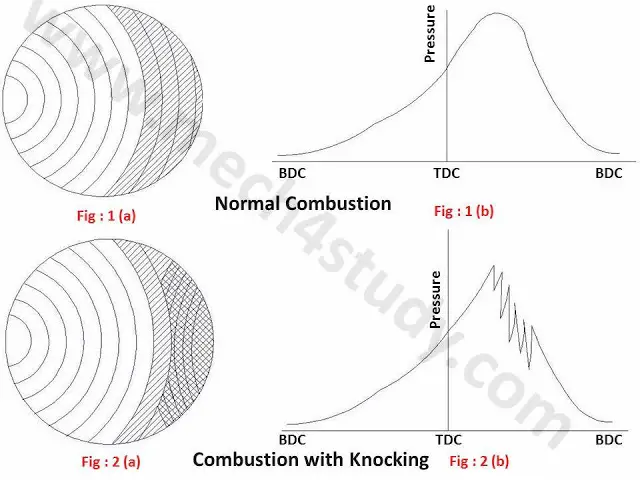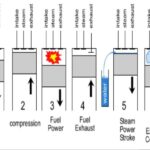Knocking is a phenomenon of generating unwanted pressure wave which create unpleasant sound and can damage engine wall during combustion in engines. Knocking is largely associated with SI engines. It occurs due to self-ignition of unburned charge into combustion chamber.
When two flame fronts in SI engines collide, they produce an unwanted pressure wave which generates unpleasant sound (knock-knock) and can damage engine wall. Learn more about how Engine knocking works in this article.
Engine Knocking :
Process:
Knocking is mainly associated with SI engines. It depends on auto ignition quality of fuel. The higher auto ignition temperature causes lower down knocking tendency. To understand whole concept of knocking let’s look out the combustion process.
When the piston reaches at TDC after compression, the spark plug produces spark which ignite the compressed mixture and starts the combustion process. It ignites only those part of mixture witch is in contact with spark plug and generates a main flame front which further ignites the whole mixture. This will generate a high temperature and pressure force inside the cylinder. This burnt part of mixture (combustion products) separate the fresh mixture from spark plug to the other end of the cylinder. As this flame front expands, it compressed the unburned part of the charge. This compression increases the temperature and pressure of unburned part of mixture. If the temperature of this part reaches its auto ignition temperature, it will ignite from other end and a new flame front starts moving towards opposite direction of main flame. When both of these flame fronts collide, it will generate a high pressure wave which produces an unpleasant sound and also damage the cylinder wall.
To clear out image of flame front, lets look at the figure given below.
Figure 1 (a) shows the top view of cylinder or combustion chamber for normal condition and 1 (b) shows the pressure distribution during power stroke for ideal condition without knocking and 2 (a) & 2 (b) shows actual condition with knocking.
It can clearly see that the normal condition generates a uniform pressure wave which is required to drive vehicle. But when the flame front compressed the fresh charge and the charge auto ignited, will create rapid change in pressure wave. This rapid change in pressure wave creates unwanted sound until the whole charge of opposite flame ignited. If the compressed mixture does not reach its auto ignition temperature during compression, the whole charge ignited by main flame front and the normal combustion takes place.
Factor affecting knocking:
Any factor which tends to decrease auto ignition temperature of charge or tends to ignite the charge except spark plug will affect knocking. Main affecting factor are given below.
Density factor:
The lower dense charge generates low energy and lower rise in temperature thus avoid knocking. If the density of charge decrease, will decreases the knocking tendency. The factors which affect the density of charge are as follow.
Compression Ratio
Increase in compression ratio will increase density of charge thus increase knocking tendency.
Mass of the charge induced:
The mass of charge depends on throttling or supercharging. A reduction in mass of induced charge, reduce the knocking tendency.
Time Factor:
The lower the time available to auto ignition will decrease the knocking tendency. The most affecting time factors are
Engine Turbulence:
Turbulence reduces the ignition lag or time available for auto ignition. So increase in turbulence will increase the main flame speed and reduce ignition lag, thus reduces knocking tendency.
Spark Plug Location:
To reduce time available for auto ignition, spark plug should locate in order to have minimum flame travel for proper combustion. Generally spark plug located at center to reduce the tendency of knocking.
Engine Size:
As the engine size increase will increase the flame travel thus increases knocking tendency.
Combustion Chamber:
Combustion chamber design play main role in flame travel. The more compact the combustion chamber has minimum flame travel distance thus reduce knocking tendency. Also, the hot spot in combustion chamber should be avoided which can ignite the charge.
Temperature Factor:
Any factor which increases the temperature of inside gases will increase the knocking tendency. These are
Inlet Temperature of Mixture:
More the inlet temperature of mixture, increase tendency of auto ignition thus increase knocking tendency.
Supercharging:
Supercharging increase both mass and temperature of inside the cylinder thus increases tendency of knocking.
Temperature of Combustion Wall
It will play main role in knocking. The higher the temperature of wall, more chance of auto ignition, thus more chance of knocking.
How to fix knocking:
We have known about knocking phenomenon and factor affecting it. The most methods are used to avoid knock are as follow.
- Spark plug location should select to minimize the flame travel distance.
- By proper cooling of Engine wall.
- Combustion chamber is so design which has less hot spot and higher turbulence.
- Uses higher auto ignition temperature fuels or add additive in gasoline to increase its knocking temperature.
- Higher engine speed will reduce knocking.
- Reduce compression ratio.
- Reduce supercharging to avoid knocking.
This is all about what is engine knocking, its affecting factors and how to fix it. If you have any query regarding this article, ask by commenting. If you like this article, don’t forget to share it on social networks. Subscribe our website for more interesting articles. Thanks for reading it.


